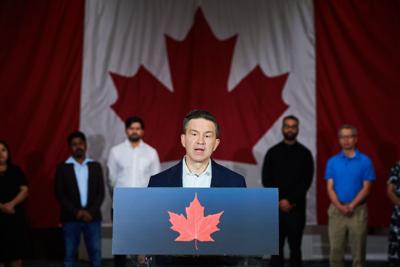Conservative Leader Pierre Poilievre’s latest call to scrap the Temporary Foreign Worker (TFW) program has everything to go viral: a simple villain (migrant workers), an innocent victim (Canadian youth) and a big hammer (abolish the program). It’s politics reverse-engineered for engagement. The outrage is the point. The policy is the prop. As the journalism world calls it, the topic is a “talker” that feeds water-cooler chat at work.
In this new economy of attention, whatever elicits the most emotions travels the furthest. Social platforms reward emotional certainty over empirical complexity, so leaders often compress messy structural problems like slow productivity growth, weak training pipelines, stagnant wage ladders, into one explosive narrative: “foreign workers are taking your kids’ jobs.”
Poilievre’s slogans of “” and Michelle Rempel Garner’s sensational claims that we are experiencing the “” is designed to scare and anger Canadians. But when you strip away the theatrics and ask for evidence that is longer than a few words, the numbers and patterns tell a different story and Canadians are sick of being fed rage-bait in place of concrete policy.
Let’s start with the basic misdiagnosis. In academia, a big “gotcha” move professors like to do is “correlation doesn’t equal causation.” But we have a situation here that doesn’t even have correlation. The TFW program was created in 1973 as a for employers to fill jobs for which qualified Canadians are not available.
Looking at data from 1973 to 2025 comparing youth unemployment rate and TFW permits shows no meaningful correlation. For example, TFW permits were low in the 1980s and 1990s, yet there were youth unemployment peaks of 16 to 19 per cent. This is much higher than today’s 14.6 per cent, even though there are much more TFW permits now. So, if the TFW program is the direct cause of high youth unemployment, shouldn’t we have seen low youth unemployment in the 1980s and 1990s?
We don’t see that because the TFW program is not the direct cause of youth unemployment. But what did happen in the 1980s and 1990s and what is starting to happen now are economic downturns and recessions. And terminating the TFW program when Canada is experiencing economic challenges amidst a trade war and a , isn’t just bad policy, it’s an irresponsible spectacle orchestrated to distract Canadians from asking for hard-hitting and evidence-based policy reforms that will actually strengthen our economy.Â
One thing I do agree with Poilievre and Michelle Rempel Garner on is the exploitative nature of the TFW program, which has been well documented by the and by . Closed, employer-specific permits concentrate power in the hands of bad actors and make it risky for workers to report wage theft or unsafe conditions.
Illegal recruiter fees trap workers in debt. Enforcement is uneven and penalties are not harsh enough to correct bad behaviour. Those are the real problems. But they are precisely the problems that rage-bait politics avoids, because fixing them requires doing policy, not performing it.
If the Conservatives truly want to improve our “broken” immigration system, they shouldn’t do it through the same reactionary and patchwork approach that they criticized their Liberal counterparts for. Instead show us your work. Bring a costed, enforceable plan built with provinces, cities, employers, unions, and crucially — migrant workers, tied to real housing and health care capacity. Telling Canadians “” is what you say about a homework assignment, not a national immigration overhaul.
If the goal is ending the exploitative nature of the TFW program, here’s a nonviral but actually useful study and report that the did from 2022 to 2024 that involved a fact-finding mission that heard from Canadian businesses from seafood processing plants to farms and orchards that said “without migrant workers these businesses wouldn’t exist.”
Here is the Senate’s recommendations:
1. Create a migrant work commission.
2. Phase out employer-specific (closed) work permits.
3. Build real pathways and supports because the work isn’t truly temporary.
4. Strengthen enforcement and compliance.
5. Guarantee barrier-free health-care access.
6. Collect more and better data.
And if the goal is to reduce youth unemployment, than temporary foreign workers and . And unlike migrant workers, who still cost money and are owed certain, albeit limited, rights, AI is cheap, fast and doesn’t complain.
I hope Poilievre’s next big policy roll out will have solutions for how to address AI-induced job losses, which is a genuinely scary and enraging threat.
Error! Sorry, there was an error processing your request.
There was a problem with the recaptcha. Please try again.
You may unsubscribe at any time. By signing up, you agree to our and . This site is protected by reCAPTCHA and the Google and apply.
Want more of the latest from us? Sign up for more at our newsletter page.


























To join the conversation set a first and last name in your user profile.
Sign in or register for free to join the Conversation